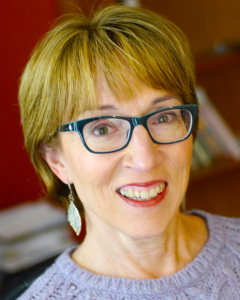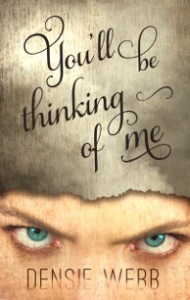
 Densie Webb is a freelance nonfiction writer and editor, and the author of several books about health and nutrition. Her articles have appeared in The New York Times and Prevention magazine. Densie and I discussed the inspiration for her fiction debut, You’ll Be Thinking of Me, her publishing process, the benefits of a critique group, and the unique challenges of writing fiction. To learn more about Densie and her work, please visit densiewebb.com.
Densie Webb is a freelance nonfiction writer and editor, and the author of several books about health and nutrition. Her articles have appeared in The New York Times and Prevention magazine. Densie and I discussed the inspiration for her fiction debut, You’ll Be Thinking of Me, her publishing process, the benefits of a critique group, and the unique challenges of writing fiction. To learn more about Densie and her work, please visit densiewebb.com.
Will you summarize You’ll Be Thinking of Me in a couple of sentences and describe the genre?
You’ll Be Thinking of Me is the story of a young woman who has a serendipitous encounter with a celebrity and, as the result of an innocent video of the two of them posted on the Internet, becomes the target of a crazed stalker. (With a capital “C,” as one reviewer put it.) And, of course, it’s about the relationship that develops between the young woman and the celebrity. I struggled with identifying the genre and finally settled on Romantic Suspense. I hesitated putting the term “romance” in there, because of the derision of the genre—something I wrote about here. http://booksbywomen.org/romance-writers-youve-got-to-own-it-by-densie-webb/ I’m learning to embrace it.
What was the inspiration for the novel?
Several years ago I saw an interview with a wildly popular young actor, whom I shall not name for fear of being labeled a cougar, and the interviewer asked him something to the effect, “Where do think it can go from here?” He was referring to all the screaming girls wherever he went. His response triggered the idea. He casually said that someone could always come out of the crowd and stab him and that would be it. For the first time, it registered with me how vulnerable celebrities are and how there are crazies out there who fantasize and obsess over them.
You’ll Be Thinking of Me is your fiction debut; even though, you’ve spent many years writing nonfiction. Which type of writing do you prefer? Why?
I’ve spent almost my whole career as a freelance writer/editor of nonfiction articles for magazines, newspapers, newsletters and books on health and nutrition. I’ve written for everything from The New York Times to Prevention Magazine, as well as writing several non-fiction books on the same topics. While I’m still doing that full time (gotta pay the bills), I prefer fiction writing. I have a thing about being in control of my time; that’s why I’ve been a freelancer all these years. But as a freelancer, you’re required to write to assignment, delivering whatever the client needs. Fiction writing gives me so much more control over what I write and how I spend my time writing. Sure, it involves deadlines, but I like the feeling that I created these characters and their lives out of nothing but a spark of an idea.
In the process of writing the book, did you discover any challenges that are unique to writing fiction? If so, how did you overcome them?
Because it is my first novel, my challenges were finding my writing voice and learning the basics of fiction writing, which is nothing like writing nonfiction. Knowing how to use words, grammar and punctuation helps, but fiction writing is completely different than writing nonfiction. One thing about my nonfiction writing that helped me with my fiction was the ability to research topics. I spend more time researching for my day job than I do actually writing. The reverse was true for fiction, but that skill set helped tremendously as I researched celebrity stalkers.
I read that you’re part of a critique group. How has the group helped to improve your writing practice? What should a new writer consider before joining a critique group?
I’ve belonged to several critique groups. The main piece of advice is that you have to be prepared to hear criticism without getting defensive. It’s not easy, but I’ve been attending critique groups for about 3 or 4 years and, while I eventually used the services of a professional developmental editor, I wouldn’t have gotten the story fully developed without them. I found my original critique group from Meetup.com. From there I’ve had 2 other offshoot critique groups. You have to find a group of people who you’re compatible with and who “get” what you’re writing and who are willing to give you more detailed feedback than “this sucks” or “this is great.”
Tell me a little about your publishing process. What’s the most important thing you learned from the experience?
Patience and perseverance! Writing and publishing, for most of us, is an agonizingly slow process. A small publisher, like I have, is faster than one of the big five publishers, but either way, it’s not an overnight event. Same goes for having an audiobook produced; mine just went live on Audible.com. The first time I thought I was “done” with my book, I queried and got a few nibbles, but nothing came of it. I spent another couple of years revising and I hired a wonderful development editor, Tiffany Yates Martin, who provided me with the final guidance I needed. I waited maybe 2 months after I received her comments before I felt ready to dig in and do what was needed. After that, I queried agents and publishers again and this time I got several requests for partials and fulls from agents, and received some “rave rejections,” but no takers. That’s when Soul Mate Publishing stepped up and said they loved it. Right after I signed the contract, I got an email from another small publisher, who expressed interest. I’m very pleased with my publisher so far.
Do you have any other fiction projects currently in the works?
I’m actually working on 2, though I’m focusing on one more than the other right now. One is a paranormal romance with what I hope is a unique twist. It’s not erotic; I can’t do erotic. I do try to make it sensual and romantic. I can take the reader right up to edge, but sex happens behind closed doors. The other WIP is women’s fiction, a family drama with the underlying theme of motherhood—how it means different things to different women and the choices they make about whether or not to be mothers. I’m hoping to finish one by the end of the year, if not before.
Thank you, Densie!